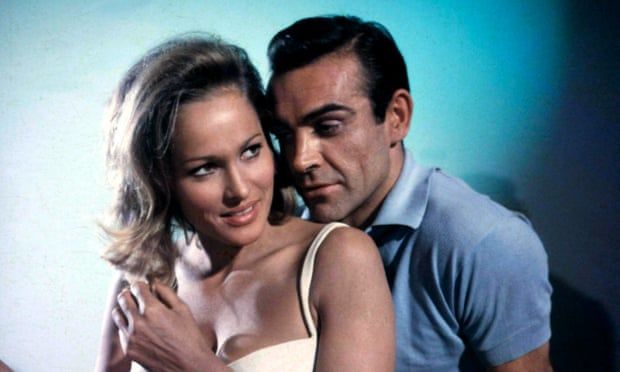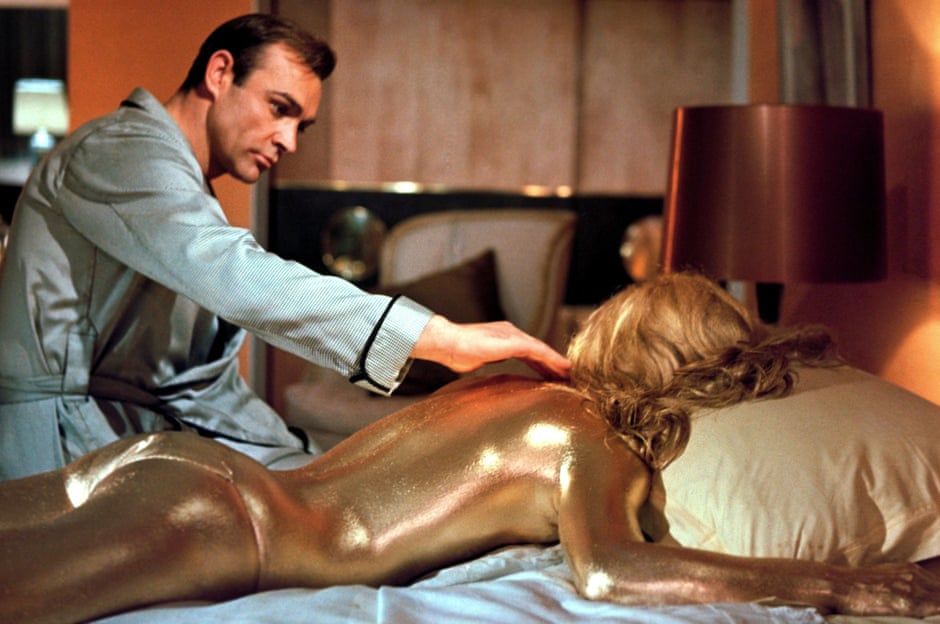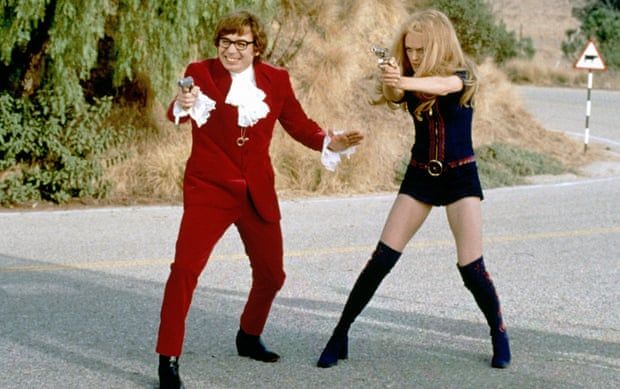
It’s No Time to Die: but is it time to revoke James Bond’s licence to kill?
These blithering women,” said James Bond, “who thought they could do a man’s work? Why the hell couldn’t they stay at home and mind their pots and pans and stick to their frocks and gossip and leave men’s work to the men?”
Ian Fleming wrote this in his spy’s first adventure, 1953’s Casino Royale, starting as he meant to go on. Dr No, published five years later, sees Bond and Honeychile Rider incarcerated in the eponymous evil genius’s lair. “Honey, get into that bath before I spank you,” Bond says, and Rider obediently does. “She said provocatively: ‘You’ve got to wash me. I don’t know what to do. You’ve got to show me.’”
 Sexual politics … Sean Connery with Ursula in 1962’s film Dr No.
Sexual politics … Sean Connery with Ursula in 1962’s film Dr No.
Nearly 70 years on and the old misogynist with his infantile projections is finally getting the symbolic castration he has long deserved. In the much-delayed Bond movie No Time to Die, the new 007 (Nomi, played by the British actor Lashana Lynch) tells the old one: “The world has moved on, Commander Bond.” While Daniel Craig’s Bond has been furloughed, Nomi has replaced him at MI6, taking his licence to kill in the process.
True, No Time to Die’s plot is microwaved hokum. Bond is back from retirement to take down Rami Malek’s Safin, an uber-villain with an east European accent and a Phantom of the Opera mask. What’s new is that Bond is second fiddle to the kind of woman who would once have been tasked with jumping into bed implausibly quickly. “You get in my way, I will put a bullet in your knee,” Nomi tells Bond, before adding brutally: “The one that works.” The implication is clear: British intelligence is no longer best served by a pale, male and stale former public schoolboy, but by a young woman of colour with more firepower, one imagines, than a Beretta in her stocking top. (Who knows, Nomi may even get a surname.) And she is right: the world has changed and Bond may no longer be fit for purpose.
Bond is a creation of the cold war, when, as Sean Egan puts it in James Bond: The Secret History, “Britain’s empire was sufficiently intact as to make plausible the idea that the UK could be an important player on the world espionage stage.” In his early years, Bond was a glamorous antidote to a glum time. Britain was emerging from postwar austerity only to see its empire disappearing over the horizon. For a grey nation getting by on powdered eggs and Spam, this rogue male’s cultivation of the finer things in life – meticulously prepared martinis, a supercharged Bentley, intercontinental leg-overs – suggested that Britain could still rule the waves and waive the rules.
By the 1960s, Fleming supposed the cold war would soon end and so devised a new enemy to ensure his brand did not become obsolete. Spectre, the villainous cabal fronted on screen by Donald Pleasence’s cat-stroking megalomaniac weirdo Ernst Stavro Blofeld, replaced the Soviet counter-espionage organisation Smersh as Bond’s adversary. This shift freed the franchise from the burden of geopolitical plausibility and imagined the future’s clash of civilisations as a sequence of nuked-up nutjobs holding the world to ransom.
 New enemy … Donald Pleasence as Blofeld in 1967’s You Only Live Twice.
New enemy … Donald Pleasence as Blofeld in 1967’s You Only Live Twice.
Bond had a new enemy, but no new politics. Womankind was reduced to a sexual smörgåsbord, a thought punched up by Roald Dahl in his script for You Only Live Twice. “Why do Chinese girls taste so different from the others?” Sean Connery’s Bond says to his love interest Ling, played by Tsai Chen, adding: “Like Peking duck is different from Russian caviar. But I love them both.” His attitude to lesbians was more straightforward: they were either to be killed (Rosa Klebb) or “cured” (Pussy Galore).
But it did not seem to matter that 007 was racist, sexist, homophobic and increasingly silly. Along with the Beatles and swinging London, the franchise had become one of Britain’s best sources of soft power. According to Jaap Verheul in The Cultural Life of James Bond: Specters of 007, the franchise was mainly a British affair in the 1950s, the novels read chiefly by lower-middle class men. That changed with the first four Bond films, which took the brand global in the 1960s. Goldfinger was particularly important in that respect, being partly set in the US and thus breaking the US market in a way paralleled only by the Beatles. Indeed, Beatlemania and Bondmania went hand in hand: I Want to Hold Your Hand was the Fab Four’s first US No 1 in 1964, while, in the same year, Goldfinger recouped its $3m (£2.1m) budget in its first two weeks. It grossed $ 46m worldwide and was at one point the fastest-grossing film of all time. The bestselling toy that year was Bond’s Aston Martin DB5.
 Brand upgrade … Connery and Shirley Eaton in Goldfinger.
Brand upgrade … Connery and Shirley Eaton in Goldfinger.
But there was a curious irony in all this global domination, set out by Simon Winder in his book The Man Who Saved Britain: A Personal Journey into the Disturbing World of James Bond. As the franchise went global, the body count of foreigners rose accordingly. “As the 1960s progressed,” wrote Winder, “Bond’s ability to maim and kill foreigners became a great consolation to millions of embittered and confused people whose traditional world picture had changed with alarming speed.” By then, Bond was “pretty much the only British national capable of damaging anybody at all”.
What should have done for Bond was not Rosa Klebb’s shoe-knife, but time. He had always been somewhat risible even to fans, a quality heroically indulged by post-Connery Bonds such as Roger Moore and Pierce Brosnan. By the 1990s, Mike Myers’s Austin Powers movies made the silliness explicit (Alotta Fagina, Ivana Humpalot), quickly followed by Rowan Atkinson’s own parody, Johnny English, while the Simpsons introduced the fan favourite, Dr No-like nemesis Hank Scorpio. (“Homer – what’s your least favourite country, Italy or France?” “France,” replies Homer. “Nobody ever says Italy,” chuckles Scorpio, ominously pushing a button.)
 Spoof … Austin Powers: The Spy Who Shagged Me, 1999.
Spoof … Austin Powers: The Spy Who Shagged Me, 1999.
With the rise of vulnerable-but-tough 21st-century action heroes such as Jack Bauer, Jason Bourne and Jack Reacher, retooling the Bond franchise in 2006 was a delicate business. “If something’s been parodied as much as that, there’s a reason for it,” Daniel Craig told me before the release of Casino Royale. That film made Bond compelling anew: he was tougher and more serious, but sympathetic, too: an orphan, a man who seemed capable of real love with realistic women, and who didn’t mind answering to Judi Dench’s matriarch M.
When Craig’s Bond and the Queen parachuted into the Olympic Stadium for the 2012 opening ceremony (both stunt doubles – their insurance premiums would have trebled the national debt), it was a symbolic moment. Two brands, both of which had arguably outlived their historical usefulness and would surely be wound down when Britain emerged as a truly egalitarian and diverse polity, were, as much as the NHS, made to typify the country not just as it was but, counterintuitively, as it was going to be.
The next Bond film, Skyfall, became the biggest-grossing instalment in the 007 franchise so far. According to Forbes, the Bond movies have raked in more than $7bn (£5.06bn) worldwide, making it the third highest-grossing franchise of all time behind Marvel and Star Wars. Kate Arthurs, the British Council’s former director of arts, cited Bond along with Shakespeare, the Premier League, the royal family, the BBC and the English language as among the reasons that the UK pipped France to the top of the Soft Power 30 Index in 2018. One estimate suggests one in five people on Earth have seen a Bond film – and it is quite likely that most of the other 80% still know that the man likes his martinis shaken, not stirred.
 Big time … Daniel Craig as James Bond in 2012’s Skyfall.
Big time … Daniel Craig as James Bond in 2012’s Skyfall.
It is arguable that the descent of Her Majesty and her tuxedoed lickspittle was a sign of what was to come in British politics, possessing the same unabashed patriotism and insistence on British exceptionalism that fuelled the daydreams for which we will be paying for decades. Now the 25th Bond movie arrives in a strange new world. In 1953, Britain still had an empire. In 2015, when the last film, Spectre, was released, we were still in the EU. Today a postcolonial, post-Brexit Britain is a geopolitical nonentity: friendless in Europe, clinging to the US, and humiliated in a recent postage stamp dispute by, with all due respect, a dot in the Indian Ocean called Mauritius.
Can James Bond continue to represent Britain with a new twist on the old cocktail, or should the franchise be terminated? Certainly this Bond, with his gammy knee and other physical shortcomings, suggests the latter: abseiling off bridges and going toe-to-toe with Johnny Foreigners 30 years his junior may finally be beyond him.
 Bring in the new … Lashana Lynch as the new 007.
Bring in the new … Lashana Lynch as the new 007.
It might well be a good thing if Daniel Craig’s licence to kill is permamently taken over by Lynch’s Nomi, or even Regé-Jean Page, the 31-year-old Bridgerton heart-throb and other rumoured Bond successor. Although, what could be more British than an old white guy thwarting opportunities for others by hanging around too long?











